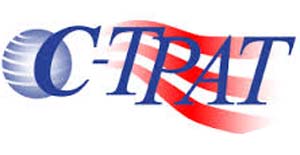C-TPAT (Customs-Trade Partnership Against Terrorism) Information: Difference between revisions
No edit summary |
|||
| (One intermediate revision by the same user not shown) | |||
| Line 1: | Line 1: | ||
{{note|This article is part of the [[Customs_Compliance_Guide_(CBP_and_CBSA)|Customs Compliance Guide]]|info}} | {{note|This article is part of the [[Customs_Compliance_Guide_(CBP_and_CBSA)|Customs Compliance Guide]]|info}} | ||
[[Image:C-tpat.jpg|300px|thumb | [[Image:C-tpat.jpg|300px|right|thumb|The Customs-Trade Partnership Against Terrorism (C-TPAT) Logo]]The '''Customs-Trade Partnership Against Terrorism (C-TPAT)''' program is a voluntary public-private sector supply chain security program led by U.S. Customs and Border Protection (CBP). Through this program, CBP works with the trade community to strengthen international supply chains and improve United States border security. CBP can provide the highest level of cargo security only through close cooperation with the principle stakeholders of the international supply chain such as importers, carriers, consolidators, licensed customs brokers, and manufacturers. The Security and Accountability for Every Port Act of 2006 provided a statutory framework for the C-TPAT program and imposed strict program oversight requirements.</onlyinclude><ref>C-TPAT: Customs-Trade Partnership Against Terrorism https://www.cbp.gov/border-security/ports-entry/cargo-security/c-tpat-customs-trade-partnership-against-terrorism</ref> | ||
== History == | == History == | ||
Latest revision as of 11:53, 1 August 2023
|
🔖 This article is part of the Customs Compliance Guide |

The Customs-Trade Partnership Against Terrorism (C-TPAT) program is a voluntary public-private sector supply chain security program led by U.S. Customs and Border Protection (CBP). Through this program, CBP works with the trade community to strengthen international supply chains and improve United States border security. CBP can provide the highest level of cargo security only through close cooperation with the principle stakeholders of the international supply chain such as importers, carriers, consolidators, licensed customs brokers, and manufacturers. The Security and Accountability for Every Port Act of 2006 provided a statutory framework for the C-TPAT program and imposed strict program oversight requirements.[1]
History
From its inception in November 2001, C-TPAT continues to grow. Today, more than 11,400 certified partners spanning the gamut of the trade community, have been accepted into the program. The partners include U.S. importers/exporters, U.S./Canada highway carriers; U.S./Mexico highway carriers; rail and sea carriers; licensed U.S. Customs brokers; U.S. marine port authority/terminal operators; U.S. freight consolidators; ocean transportation intermediaries and non‐operating common carriers; Mexican and Canadian manufacturers; and Mexican long‐haul carriers, all of whom account for over 52 percent (by value) of cargo imported into the U.S.[2]
How C-TPAT Works
When an entity joins C-TPAT, an agreement is made to work with CBP to protect the supply chain, identify security gaps, and implement specific security measures and best practices. Applicants must address a broad range of security topics and present security profiles that list action plans to align security throughout the supply chain.
C‐TPAT members are considered to be of low risk, and are therefore less likely to be examined at a U.S. port of entry.
Benefits of C-TPAT
C-TPAT Partners enjoy a variety of benefits, including taking an active role in working closer with the U.S. Government in its war against terrorism. As they do this, Partners are able to better identify their own security vulnerabilities and take corrective actions to mitigate risks. Some of the benefits of the program include:
- Reduced number of CBP examinations
- Front of the line inspections
- Possible exemption from Stratified Exams
- Shorter wait times at the border
- Assignment of a Supply Chain Security Specialist to the company
- Access to the Free and Secure Trade (FAST) Lanes at the land borders
- Access to the C-TPAT web-based Portal system and a library of training materials
- Possibility of enjoying additional benefits by being recognized as a trusted trade Partner by foreign Customs administrations that have signed Mutual Recognition with the United States
- Eligibility for other U.S. Government pilot programs, such as the Food and Drug Administration’s Secure Supply Chain program
- Business resumption priority following a natural disaster or terrorist attack
- Importer eligibility to participate in the Importer Self-Assessment Program (ISA)
- Priority consideration at CBP’s industry-focused Centers of Excellence and Expertise
How To Become a C-TPAT Partner
Participation in C-TPAT is voluntary and there are no costs associated with joining the program. Moreover, a company does not need an intermediary in order to apply to the program and work with CBP; the application process is easy and it is done online. The first step is for the company to review the C-TPAT Minimum Security Criteria for their business entity to determine eligibility for the program. The second step is for the company to submit a basic application via the C-TPAT Portal system and to agree to voluntarily participate. The third step is for the company to complete a supply chain security profile.
Other Trusted Trader Programs
- FAST
- Free and Secure Trade, is a joint initiative between CBP and CBSA designed to enhance border security while speeding up the processing of low risk shipments. Carriers that are FAST approved for the U.S. are able to transport FAST shipments, and are afforded special processing at the border including dedicated lanes and front of line line processing in the case of inspections.
- CSA
- Customs Self Assessment allows for the clearance of goods imported by a CSA Approved importer and transported by a CSA Approved carrier. For a shipment to clear under CSA both the importer and carrier must be CSA Approved, and the driver must be registered with either the Commercial Driver Registration Program (CDRP) or the Free And Secure Trade (FAST) driver registration program.
- PIP
- Partners in Protection (PIP) is a cooperative program between private industry and the CBSA aimed at enhancing border and trade chain security. This voluntary program has no membership fee. It is designed to streamline and make border processes more efficient for low-risk, pre-approved businesses recognized as trusted traders.
References
- ↑ C-TPAT: Customs-Trade Partnership Against Terrorism https://www.cbp.gov/border-security/ports-entry/cargo-security/c-tpat-customs-trade-partnership-against-terrorism
- ↑ https://en.wikipedia.org/wiki/Customs-Trade_Partnership_Against_Terrorism
